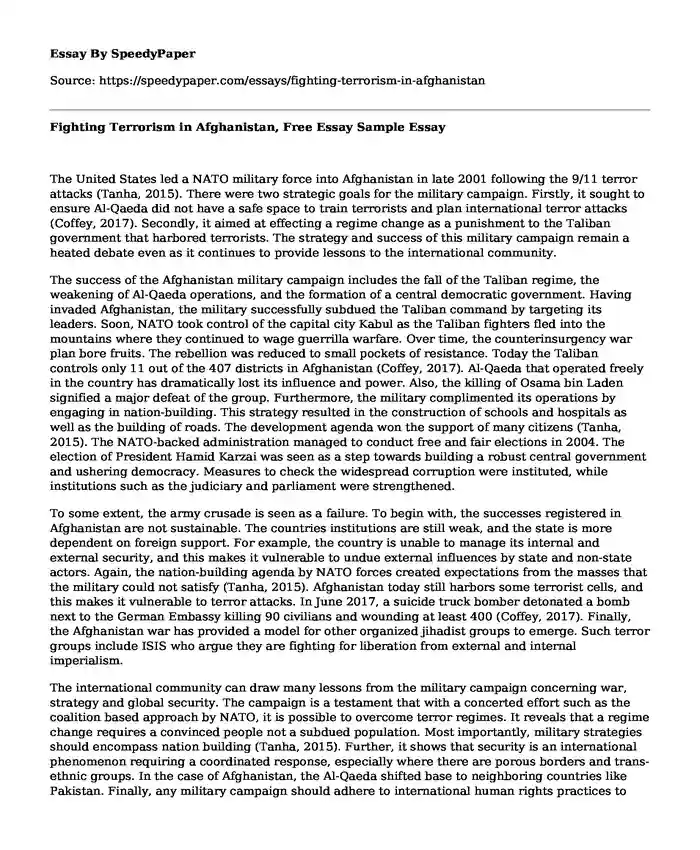The United States led a NATO military force into Afghanistan in late 2001 following the 9/11 terror attacks (Tanha, 2015). There were two strategic goals for the military campaign. Firstly, it sought to ensure Al-Qaeda did not have a safe space to train terrorists and plan international terror attacks (Coffey, 2017). Secondly, it aimed at effecting a regime change as a punishment to the Taliban government that harbored terrorists. The strategy and success of this military campaign remain a heated debate even as it continues to provide lessons to the international community.
The success of the Afghanistan military campaign includes the fall of the Taliban regime, the weakening of Al-Qaeda operations, and the formation of a central democratic government. Having invaded Afghanistan, the military successfully subdued the Taliban command by targeting its leaders. Soon, NATO took control of the capital city Kabul as the Taliban fighters fled into the mountains where they continued to wage guerrilla warfare. Over time, the counterinsurgency war plan bore fruits. The rebellion was reduced to small pockets of resistance. Today the Taliban controls only 11 out of the 407 districts in Afghanistan (Coffey, 2017). Al-Qaeda that operated freely in the country has dramatically lost its influence and power. Also, the killing of Osama bin Laden signified a major defeat of the group. Furthermore, the military complimented its operations by engaging in nation-building. This strategy resulted in the construction of schools and hospitals as well as the building of roads. The development agenda won the support of many citizens (Tanha, 2015). The NATO-backed administration managed to conduct free and fair elections in 2004. The election of President Hamid Karzai was seen as a step towards building a robust central government and ushering democracy. Measures to check the widespread corruption were instituted, while institutions such as the judiciary and parliament were strengthened.
To some extent, the army crusade is seen as a failure. To begin with, the successes registered in Afghanistan are not sustainable. The countries institutions are still weak, and the state is more dependent on foreign support. For example, the country is unable to manage its internal and external security, and this makes it vulnerable to undue external influences by state and non-state actors. Again, the nation-building agenda by NATO forces created expectations from the masses that the military could not satisfy (Tanha, 2015). Afghanistan today still harbors some terrorist cells, and this makes it vulnerable to terror attacks. In June 2017, a suicide truck bomber detonated a bomb next to the German Embassy killing 90 civilians and wounding at least 400 (Coffey, 2017). Finally, the Afghanistan war has provided a model for other organized jihadist groups to emerge. Such terror groups include ISIS who argue they are fighting for liberation from external and internal imperialism.
The international community can draw many lessons from the military campaign concerning war, strategy and global security. The campaign is a testament that with a concerted effort such as the coalition based approach by NATO, it is possible to overcome terror regimes. It reveals that a regime change requires a convinced people not a subdued population. Most importantly, military strategies should encompass nation building (Tanha, 2015). Further, it shows that security is an international phenomenon requiring a coordinated response, especially where there are porous borders and trans-ethnic groups. In the case of Afghanistan, the Al-Qaeda shifted base to neighboring countries like Pakistan. Finally, any military campaign should adhere to international human rights practices to avoid criticism of human torture.
The war in Afghanistan is justified as a necessary to free the citizens from a terrorist regime and to re-establish global security. While the military campaign succeeded in toppling the reign of the Taliban and ushered in democratic institutions, it has created dependency and left an administration that is vulnerable to insecurity. This campaign informs future strategies for managing political change in a participatory and less coercive manner.
References
Coffey, L. (June, 2017). What does America consider success in Afghanistan? The Heritage Foundation. Retrieved from https://www.heritage.org/defense/commentary/what-does-america-consider-success-afghanistan.
Tanha, M. (May 08, 2015). Afghanistan: A story of successful US failures. The Diplomat. Retrieved from https://thediplomat.com/2015/05/afghanistan-a-story-of-successful-us-failures.
Cite this page
Fighting Terrorism in Afghanistan, Free Essay Sample. (2022, Mar 11). Retrieved from https://speedypaper.net/essays/fighting-terrorism-in-afghanistan
Request Removal
If you are the original author of this essay and no longer wish to have it published on the SpeedyPaper website, please click below to request its removal:
- Free Essay on 9/11 Mysteries: Demolition Film Summary
- Essay Example on Customer Image Research
- Chain of 20 Restaurants - Social Media Marketing Free Essay
- Cross-cultural Communication Reflection. Free Essay Example.
- Essay Sample on American History. The Great Depression and the New Deal.
- Essay Sample on Healthcare Market Competition
- Essay Sample on Andean Feminism Summary
Popular categories





